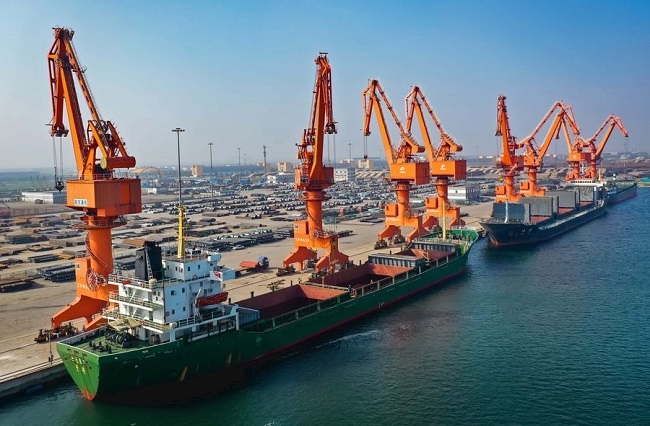Editor's note: Wang Huiyao is the president of the Center for China and Globalization.
Globalization has come under pressure in the wake of the COVID-19 pandemic. Although containment measures are now gradually being loosened in many countries, cross-border flows of people, goods and capital will be diminished for some time to come.
New forecasts from the United Nations (UN) Conference on Trade and Development predict businesses will cut overseas investment by 40 percent this year as multinationals face reduced profits and pressure to bring production closer to home. The World Trade Organization (WTO) expects trade to decline by 13 to 32 percent this year.
Global institutions have also struggled to deal with the challenges of COVID-19. This year marks the 75th anniversary of the UN. But the UN and other global organizations have found their ability to respond to the pandemic hampered by a lack of capabilities and multilateral consensus.
COVID-19 is not the first crisis the current global system has faced in the past two decades. Even before the pandemic, other shocks such as the 2008 financial crisis, refugee crises, and looming climate and environmental crises, have raised serious questions about the sustainability and impact of globalization.
While COVID-19 has thrown the risks of globalization into sharper relief, it is not integration itself that is to blame. Rather, these recent crises reflect how global governance mechanisms have not kept up with the demands of a complex and highly integrated 21st century world. The absence of adequate institutions to guide and manage cross-border flows has resulted in an unbalanced form of globalization.
It should be remembered that globalization is not a goal in itself, but a vehicle to improve people's living standards worldwide. However, much of the benefits of our current form of globalization have been captured by elites in both developing and industrialized countries, widening gaps between social classes, aggravating structural imbalances, and leading to adverse consequences.
These imbalances have fueled anti-globalization sentiment and a rise of populism and protectionism, as seen in the outcome of the 2016 U.S. presidential election, Brexit, and France's Yellow Vests movement.
The world now faces challenges on three fronts from a public health crisis, economic recession, and political fallout from the pandemic, which has put more strain on globalization and multilateral cooperation. Yet, this unprecedented situation also offers a unique chance to reassess and improve the way we manage globalization so it can deliver benefits to all.
As a rising economic power and supporter of multilateralism and globalization, China can help achieve this by playing a key role in the much needed reform of global governance.
Since China joined the WTO in 2001, it has gradually moved from being a participant to a driving force of globalization. This role was evident in the 2008 financial crisis when China's actions were crucial to stabilizing and then revitalizing the world economy.
As well as supporting existing global institutions, China is increasingly offering innovative solutions for global governance and the provision of global public goods, such as the Belt and Road Initiative (BRI). Amidst the pandemic, China has sought to fulfill its global responsibilities by delivering medical supplies to hard-hit areas and sharing its experience in fighting against COVID-19.

Cargo ships at a wharf of Wenfeng port in the China (Hebei) Pilot Free Trade Zone Caofeidian area in north China's Hebei Province, August 27, 2019. /Xinhua
Now, as the global economy faces headwinds from protectionism and populism, China can help forge a more inclusive and balanced globalization by continuing to open up its own economy to trade and investment.
In this regard, the recent Two Sessions in Beijing sent promising signals to the world.
At a joint panel session with economic policy advisors at the third session of the 13th CPPCC National Committee, President Xi Jinping called for unwavering efforts to make economic globalization more open, inclusive, and balanced so that its benefits are shared by all, and to build an open world economy. The government work report also outlined plans to shorten the negative list for foreign investment, further develop free trade zones, and fully implement the new foreign investment law.
Given China's large and growing domestic market, further opening up will help offset some of the fall in demand in other countries and stimulate global growth. China's commitment also serves as a catalyst for continued liberalization and integration of the global economy.
There are two other ways China can contribute to globalization.
The first is supporting regional integration in the Asia-Pacific region. With the global free trade agenda stalled, regional agreements have become an important driving force for international cooperation. China should continue to push for completion of the Regional Comprehensive Economic Partnership (RCEP) and strongly consider joining the Comprehensive and Progressive Agreement for Trans-Pacific Partnership (CPTPP).
Second, at the global level, China should explore ways to work with key players in forging new global governance solutions. Despite transpacific tensions, it is crucial that China and the U.S. work together on this. The European Union (EU) is another important partner and active in promoting the reform of multilateralism. Enhancing cooperation between China, the EU, and the U.S. – for example, through a new trilateral mechanism – could help forge consensus on WTO reform and find a workable plan to revive the organization.
In the wake of COVID-19, as a responsible power, China can support globalization by continuing to open up and working with others to innovate global governance and forge a more balanced form of globalization.
Source: CGTN







